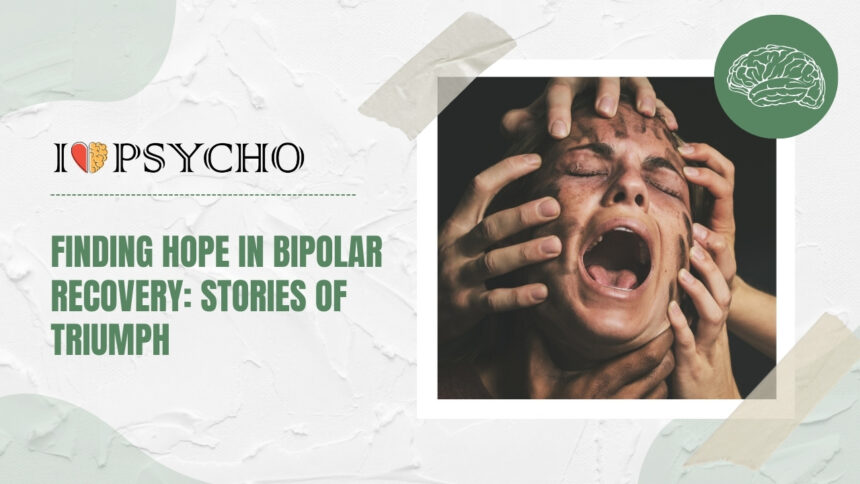Introduction to Bipolar Disorder
Welcome to a journey of hope and triumph in the realm of bipolar recovery. Living with bipolar disorder can feel like navigating through stormy seas, but amidst the challenges lie stories of resilience, healing, and newfound strength. In this blog post, we will explore the importance of seeking treatment, effective strategies for managing bipolar disorder, personal accounts from individuals who have triumphed over adversity, and insights from mental health professionals on finding hope for the future. Join us as we delve into the world of bipolar recovery and discover that even in the darkest moments, there is always a glimmer of light waiting to shine through.
The Importance of Seeking Treatment
Seeking treatment for bipolar disorder is a crucial step towards reclaiming control of your life. It’s not just about managing symptoms; it’s about regaining stability and finding a path to wellness. By reaching out for help, you are acknowledging the challenges you face and taking proactive steps towards healing.
Professional support can provide you with valuable tools and strategies to navigate the ups and downs that come with bipolar disorder. Therapy sessions can offer insight into your thoughts and behaviors, empowering you to make positive changes in your life. Medication management under the guidance of a psychiatrist can help stabilize mood swings and alleviate distressing symptoms.
Remember, seeking treatment is not a sign of weakness but rather a courageous decision to prioritize your mental health. You deserve to live a fulfilling life free from the constraints of untreated bipolar disorder.
Strategies for Managing Bipolar Disorder
Living with bipolar disorder can present unique challenges, but implementing effective strategies can help manage symptoms and improve quality of life. One crucial strategy is maintaining a consistent routine, including regular sleep patterns and meal times. Engaging in regular exercise has been shown to have positive effects on mood regulation and overall well-being.
Developing healthy coping mechanisms such as mindfulness practices or journaling can also be beneficial in managing stress and emotions. It’s important to establish open communication with loved ones about your condition and needs for support. Seeking therapy or counseling can provide valuable tools for navigating the highs and lows of bipolar disorder.
Learning to recognize early warning signs of mood episodes is key in preventing severe fluctuations. Mindfulness-based techniques like deep breathing exercises or meditation can aid in staying grounded during turbulent times. Remember, finding the right combination of strategies may take time, so be patient with yourself as you navigate this journey towards better mental health management.
A Holistic Approach to Bipolar Recovery
When it comes to bipolar recovery, a holistic approach considers the whole person – mind, body, and spirit. It goes beyond just managing symptoms and focuses on overall well-being.
Incorporating healthy lifestyle habits like regular exercise, balanced nutrition, and sufficient sleep can play a significant role in stabilizing mood swings.
Mindfulness practices such as meditation and yoga can help individuals with bipolar disorder cultivate self-awareness and manage stress more effectively.
Therapeutic interventions like talk therapy or counseling provide a safe space for exploring emotions, thoughts, and behaviors that contribute to the management of bipolar symptoms.
Additionally, alternative treatments like acupuncture or art therapy may complement traditional methods by promoting relaxation and self-expression.
Challenges of Living with Bipolar Disorder
Living with bipolar disorder presents a unique set of challenges that can impact every aspect of daily life. The unpredictable nature of mood swings can make it difficult to maintain relationships, hold down a job, or even complete simple tasks.
The constant battle between the highs and lows can be emotionally exhausting, leaving individuals feeling overwhelmed and isolated. Managing symptoms like impulsivity during manic episodes and extreme fatigue during depressive episodes requires constant vigilance.
Stigma surrounding mental health conditions like bipolar disorder can also create barriers to seeking help and receiving support from others. Many individuals may feel misunderstood or judged by those who are unfamiliar with the complexities of the condition.
Finding the right treatment plan that works for each individual can be a trial-and-error process, often involving medication adjustments and therapy sessions. It takes time and patience to find what helps manage symptoms effectively.
Despite these challenges, many individuals living with bipolar disorder find strength in their resilience and determination to overcome obstacles on their journey towards recovery.
The Journey of Recovery
Embarking on the journey of recovery from bipolar disorder is a courageous and transformative process. It’s not always easy, but every step forward is a victory in itself. Each day presents new challenges to overcome and small victories to celebrate along the way.
The path to recovery is unique for everyone, filled with ups and downs, twists and turns. It requires patience, resilience, and self-compassion. It’s about learning to navigate through the stormy seas of emotions while holding onto hope for calmer waters ahead.
Recovery isn’t just about managing symptoms; it’s also about rediscovering yourself beyond your diagnosis. It’s an opportunity for personal growth, self-discovery, and healing old wounds. The journey may be long and arduous at times, but it can also be incredibly rewarding.
As you progress on your recovery journey, remember that setbacks are a natural part of the process. They don’t define your progress or diminish your strength. With each setback comes an opportunity to learn more about yourself and grow stronger in facing future challenges head-on.
Stories of Triumph: Personal Accounts from Those Living with Bipolar Disorder
Every individual living with bipolar disorder has a unique journey filled with challenges and victories. One person’s triumph could be finding the right treatment plan that works for them, while another’s could be successfully navigating relationships despite the ups and downs.
There are stories of resilience, courage, and perseverance from those who have faced the darkest moments of their mental health struggles head-on. These personal accounts serve as reminders that recovery is possible, even in the midst of uncertainty.
From learning coping mechanisms to embracing self-care practices, each story sheds light on the strength found within oneself when faced with adversity. Sharing these experiences not only inspires others but also fosters a sense of community among individuals walking similar paths.
Through vulnerability and authenticity, these personal narratives offer hope and encouragement to anyone grappling with bipolar disorder. In a world where stigma still exists, these stories stand as testaments to the power of resilience and determination in overcoming life’s toughest challenges.
Overcoming Stigma and Building a Support System
Navigating the world with bipolar disorder can be challenging, especially when faced with societal stigma. The misconceptions and stereotypes surrounding mental health issues often lead to feelings of shame and isolation. However, overcoming this stigma begins with education and awareness.
Building a strong support system is crucial in this journey towards acceptance and understanding. Surrounding yourself with empathetic friends, family members, or even support groups can provide a sense of belonging and validation. Sharing your experiences openly can help break down barriers and reduce the impact of stigmatizing beliefs.
It’s important to remember that seeking help is not a sign of weakness but rather a brave step towards self-care. By reaching out to professionals for guidance and treatment, individuals living with bipolar disorder can effectively manage their symptoms and improve their quality of life. Together, we can create a more compassionate society that embraces mental health challenges without judgment or discrimination.
Seeking Professional Help and Medication Management
When it comes to bipolar disorder, seeking professional help and medication management are crucial steps in the journey towards recovery. Consulting with a mental health professional who specializes in mood disorders can provide valuable insight and guidance tailored to your specific needs.
Through therapy sessions, you can learn effective coping strategies, identify triggers, and develop skills to manage symptoms. Medication prescribed by a psychiatrist can help stabilize moods and reduce the frequency and severity of manic or depressive episodes.
It’s important to communicate openly with your healthcare team about any concerns or side effects you may experience while taking medication. Finding the right treatment plan may take time and adjustments, but staying committed to the process is key in managing bipolar disorder effectively.
Remember that seeking help is a sign of strength, not weakness. By working collaboratively with professionals, you can empower yourself on the path towards better mental health and overall well-being.
Hope for the Future: Interview with a Mental Health Professional
I had the privilege of sitting down with a mental health professional to discuss the future outlook for individuals living with bipolar disorder. Their insight was both enlightening and inspiring. The professional emphasized the importance of ongoing treatment, including therapy and medication management, in maintaining stability.
We delved into the advancements in mental health care and how tailored approaches are now more accessible than ever before. The expert highlighted the significance of personalized treatment plans that address each individual’s unique needs. They stressed that recovery is not a linear path but rather a journey full of ups and downs.
In our conversation, we touched on destigmatizing mental illness and creating supportive communities where individuals feel understood and accepted. The mental health professional expressed optimism about the evolving landscape of mental healthcare, offering hope for those navigating their way through bipolar disorder.
As we wrapped up our discussion, it became evident that while challenges may arise, there is a growing sense of empowerment and resilience among those seeking help. Hope truly does exist for the future of bipolar recovery.
Conclusion
As we’ve explored the journey of bipolar recovery, it’s evident that hope is a powerful force in overcoming challenges. Seeking treatment, implementing effective strategies, and building a strong support system are crucial steps towards managing bipolar disorder successfully. The stories of triumph shared by individuals who have navigated this path serve as beacons of inspiration for others facing similar struggles.
Though living with bipolar disorder can present its share of difficulties, it’s important to remember that recovery is possible. By taking a holistic approach that includes professional help, medication management, and self-care practices, individuals can work towards stability and overall well-being.
In the face of stigma and misconceptions surrounding mental health conditions like bipolar disorder, sharing personal experiences and seeking understanding from others can help break down barriers and foster empathy within communities.
With hope guiding the way forward, there is optimism for the future. By continuing to raise awareness, offer support, and advocate for improved resources and services in mental health care, we can create a more inclusive society where those with bipolar disorder feel empowered to embrace their journeys towards recovery.
Through resilience, determination, and compassion – there is always light at the end of the tunnel for those on the path to bipolar recovery. Let us hold onto hope as we walk together towards brighter days ahead.









